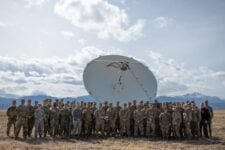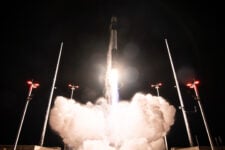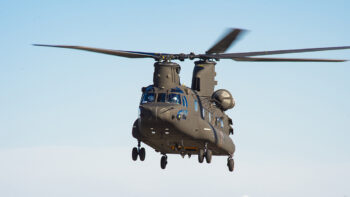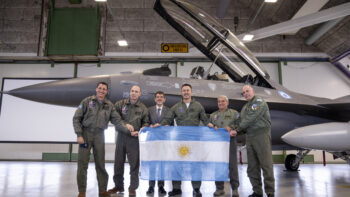
The Space Development Agency will begin launching its Tranche 1 Transport Layer communications mesh network in 2024. (Image: Northrop Grumman)
WASHINGTON: Northrop Grumman has tapped Airbus U.S. Space and Defense to provide the baseline bus under its contract with the Space Development Agency’s to build satellites for a future communications mesh network, the two companies announced today.
Northrop has been assembling a team to provide 42 birds for SDA’s so-called Tranche 1 Transport Layer (T1TL) of high capacity, low latency communications satellites in Low Earth Orbit (LEO), last month announcing that it was partnering with Mynaric and Innoflight in development of critical optical inter-satellite links. The “bus” — the main body of a satellite — to be provided by Airbus U.S. is derived from a commoditized version already on the commercial market.
Blake Bullock, Northrop Grumman’s vice president, communication systems, strategic space systems, told Breaking Defense that with the partnerships, her company has “fully embraced the SDA’s rapid, go-to-market spirit. It’s this vision for speed that allows us to field an innovative system quickly.”
SDA in February awarded contracts to three firms, totaling $1.8 billion, for the T1TL constellation, which is being designed as a backbone for the Pentagon’s Joint All Domain Command and Control (JADC2) concept.
Under the program, each company is to develop and build 42 prototype satellites to be delivered in time for launch to begin in September 2024. The contract amounts, however are different: Northrop Grumman Strategic Space Systems’s contract was worth approximately $692 million; Lockheed Martin’s, approximately $700 million; and York Space Systems’s, approximately $382 million.
The agency asked for almost $987 million in its fiscal year 2023 budget for T1TL research and development.
Airbus U.S., which is the defense-oriented US arm of European aerospace powerhouse Airbus, will provide a variant of its ARROW bus sporting a larger payload hold and more power, according to the firm’s press release. “This modular solution offers a scalable 300 – 500 kg bus,” the release noted, and will be produced by the company’s Florida-based joint venture with OneWeb, Airbus OneWeb Satellites.
Airbus U.S. has been working hard to expand its footprint with the Defense Department and the Intelligence Community — an effort which has been somewhat complicated despite its two-year-old Special Security Arrangement, due to different policies affecting agency contracting with foreign subsidiaries. For example, the National Reconnaissance Office’s recent procurement of commercial optical imagery barred non-US firms from bidding.
RELATED: Airbus eyes growing US market for space-related optical systems
“This award underscores Airbus U.S.’s mission to develop and deliver, in the U.S., technology critical to the U.S. warfighter,” Rob Geckle, Airbus U.S. president and CEO, said in the press release.






















